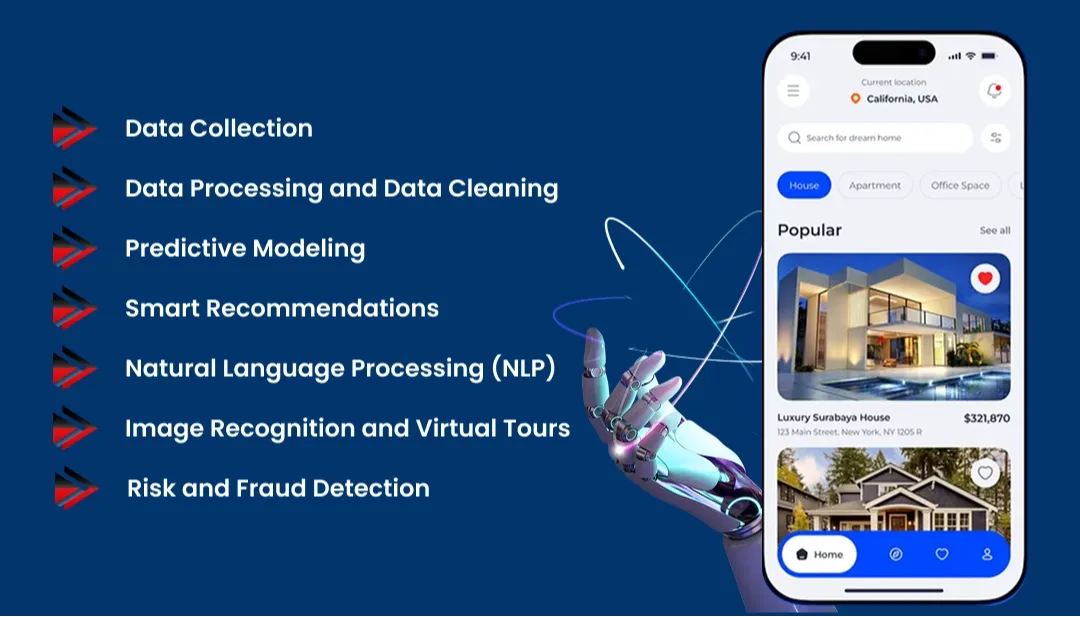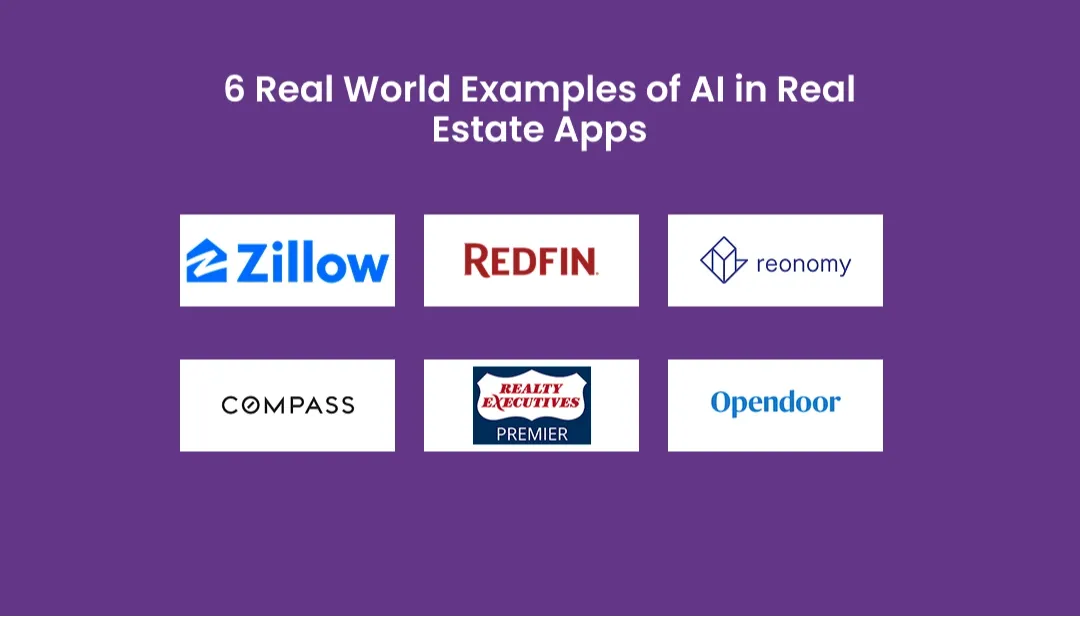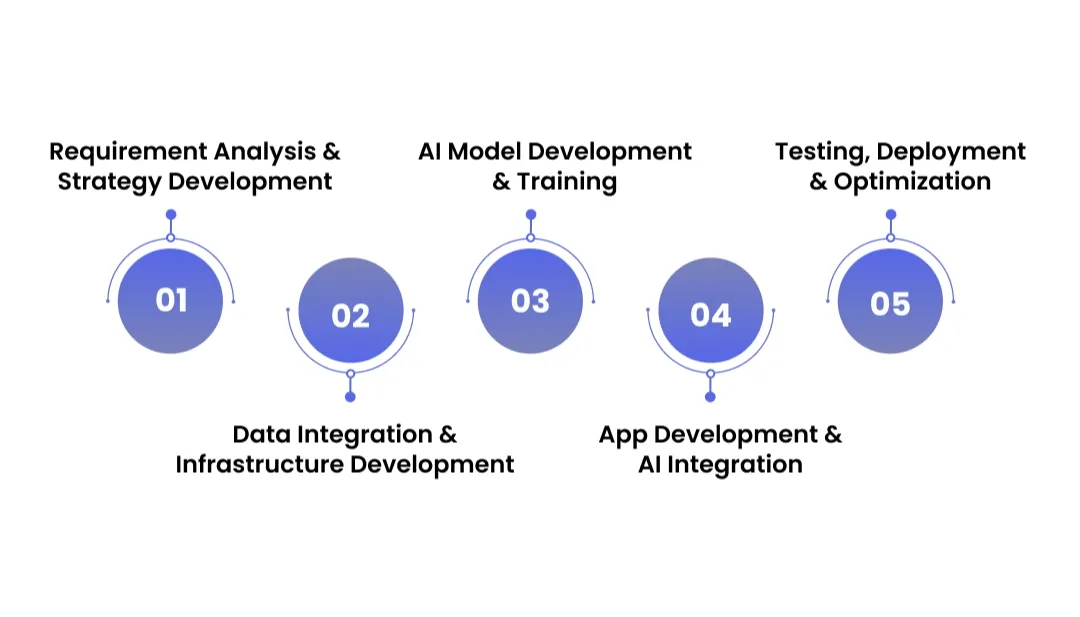AI In Real Estate: The Smart Tech Behind Modern Property Management
Dipti Singhal
Jun 13, 2025

The real estate industry is undergoing a digital transformation, and Artificial Intelligence (AI) is leading the charge. Experts estimate that the global AI in the real estate market by 2030 will exceed $1.5 billion as consumers increasingly demand automation and smart decision-making processes. From tenant screening to predictive maintenance, virtual tours, and chatbots, AI-driven technology is making property management easier than ever before. Whether you are a property manager, investor, or developer, it's critical to embrace AI in order to compete in a tech-first world. This blog will unpack how AI is reinventing property management and how it will continue to shape the real estate industry.
Overview of AI in Real Estate
AI in real estate industry is already changing the way properties are bought, sold, managed, and invested in utilizing data-driven technologies. Predictive analytics, property valuations, smart search, and virtual assistants are helping to rewrite the decision-making process.
AI is automating ordinary tasks, improving routine decision-making, and providing personalized experiences for users. Large real estate portals are using AI to recommend properties, identify fraudulent activity, enhance communication, and glean the most current market information. Property managers will find easy access to maintenance issues, tenant screening, rent collection, and more.
AI is an important aspect of the modernization of the industry. It is changing the way business will be done in real estate and, in some sense, making real estate smarter, faster, and easier for us all!
Also Read - How To Build A Real Estate App
How Does AI in the Real Estate Industry Work?

The AI in commercial real estate works by augmenting, automating, and optimizing property functions, leveraging property data with algorithmic approaches. Here's a detailed review of the AI process in real estate:
1. Data Collection
AI begins the cycle of AI in real estate via data collection with large structured and unstructured amounts of data collected from many sources- property listings, historical sales data, market data, satellite imagery, demographic data (social media, customer conversations, etc.).
2. Data Processing and Data Cleaning
The raw data is then processed and cleaned from errors and inconsistencies, data is then cleaned, and ideally, machine learning models are trained on the processed data to provide automated work or recognition of patterns that would provide a statement about the future.
3. Predictive Modeling
AI applications in real estate can model predictive models using past or historical data and current market indicators to forecast the future value of property, potential rental yields, and changes and trends in markets; historical data can be used to assist an investor/agent in better decision making that is based on data.
4. Smart Recommendations
Using your property preferences, your property search habits, and your behaviors, in combination with your search history, AI can provide personalized recommendations for property to buy or rent, ultimately helping you garner useful listings in a more timely manner and with more satisfaction.
5. Natural Language Processing (NLP)
NLP is capable of recognizing and responding to specific customer queries in real time, allowing AI chatbots to arrange viewings and, in some cases, conduct conversations through a simple negotiation, which is an expanded experience without a human agent.
6. Image Recognition and Virtual Tours
AI is capable of assessing the quality, features, and condition of the property images. Generative AI in real estate creates virtually staged immersive 3D tours to enrich the remote buying and selling experiences.
7. Risk and Fraud Detection
AI applications in real estate scan legal documents, ownership records, and financial transactions to identify many forms of fraud or irregularities and enable safer, cleaner, and fully transparent deal documentation.
Also Read - Top 10 Real Estate App Development Companies
Top 10 Uses for AI in Real Estate
We are here with your frequently searched query answer, "How to use AI in real estate." Here is the guide that will tell you all of it.
Property Valuation
AI will analyze market trends and property features and track sales data to better value property in real-time. Ai in real estate development will help buyers, sellers, and agents make actively informed decisions while providing better transparency to the valuation while also reducing some of the reliance on a formal appraisal.
Predictive Analytics
ai in real estate development can map predictive data to help assess potential future property prices, rental yields, and investment potential. Real estate professionals, as well as investors, will be able to take the data and apply the insights in order to make more informed decisions to lower risk around their assets and improve returns over time.
Smart Property Search
AI use cases in real estate have amazing search engines that improve property discovery by relying on personalization and NLP to provide the listings a user might want based on their past behavior, property preferences, and communication intent. This significantly enhances the overall user experience for the buyer or renter and reduces the time it takes to find a property.
Chatbots And Virtual Assistants
AI solutions carry full customer service capabilities 24/7, handling inquiries, bookings for property visits, and providing real-time details and information. AI chatbots reduce the need for conversations with the potential client, thereby automating the lead nurturing process. AI for real estate investment provides clients with responses while strengthening the expectation that there is an ongoing dialogue regardless of engagement through the use of technology.
Fraud Detection
AI detects patterns and irregularities in property documents and transactions that help identify possible fraud, title concerns, and even financial irregularities. Creating trust is critical when you're dealing with real estate price points and unknown online sales.
Automated Valuation Models (AVM)
AVMs, which are powered by commercial real estate AI, provide instantaneous and automated property appraisals based on real-time data with algorithmic-based formulas, speeding up the mortgage approval process and property evaluation process while increasing accuracy and removing any bias from people.
Tenant Screening
AI for realtors can automatically and instantaneously screen potential tenants for landlords by analyzing background checks, credit scores, rental history, and even social behavior. This enables the landlord to select reliable tenants while minimizing potential discrimination and lessening their risks of being vacant.
Automated Property/Asset Management
AI helps with the automating of tenancy schedules, rent collection, and emergency service requests; however, more importantly, AI for real estate marketing can assist with predictive maintenance alerts and automating many workflows that apply more broadly to help landlords and property managers be more efficient and maximize revenues.
Market Analysis And Investment Insights
Artificial intelligence and real estate are continually monitoring markets across the real estate spectrum and various demographic trends; economic indicators are also analyzed and collated to develop insights that serve investment purposes by identifying potential markets or investments to focus on, maximizing brief periods of research while optimizing their portfolio.
Virtual Tours Or Staged Property
Conversational AI for real estate provides the advanced ability to offer interactive, immersive experiences of virtual walkthroughs of property; we are no longer limited to a physical tour with property staging options such as furniture, color changes, or renovations. This offers a time savings and marketing strategy by also creating buyer interest in the remote buyer.
6 Real World Examples of AI in Real Estate Apps

Here are the incredible real-world examples of AI in commercial real estate that you must go through.
Zillow
Zillow real estate AI tools have developed artificial intelligence to help with its "Zestimate" home valuation feature. Zestimate identifies current home valuations based on user-submitted data, historical public data, and trends in the home market. Zestimate allows users to quickly gauge property value, which can help them decide whether they want to move forward and contact an agent.
Redfin
Redfin real estate AI software has incorporated machine learning and real estate into its operation to enhance home search through personalized recommendations, predictive pricing analytics, and augmented virtual touring in an effort to assist home buyers and sellers in interacting with listings more intellectually and from a time-efficiency perspective.
Reonomy
Reonomy uses artificial intelligence to provide property intelligence data in commercial real estate. Reonomy works by analyzing ownership data, property characteristic data, and property transaction history, which enables investors and brokers to find new opportunities more precisely and gives them the ability to do deeper research very easily compared to a laborious process previously.
Compass
Compass provides real estate agents access to artificial intelligence applications that provide home recommendations, pricing trend analyses, automated marketing, documents, etc. Compass has a great user experience with projects called "Collections" that allow clients to interact collaboratively with their agents and research homes visually.
Rex
Rex has created an AI-based real estate application that can market homes directly to potential buyers by using behavioral data for predictive targeting, employing a machine learning network to fine-tune many facets of home sales. Rex bypasses the traditional MLS listings for the homes they market and has become very intelligent with pricing and outreach.
Opendoor
Opendoor uses AI in real estate investment to make instantaneous homeowner offers to prospective sellers and buyers. AI is used in determining price prediction for the home, automating a transaction, and also providing a near-instantaneous option to sellers when pricing their home. Buyers get real-time feedback from sellers, which allows buying and selling to be more convenient and not reliant upon agents.
Key Implementation Stages of AI in Real Estate

Integrating machine learning for real estate is a deliberate and pragmatic, step-wise process to ensure the final solution maximizes functionality, performance, and user experience. When you contract with a professional Real Estate App Development Company, the AI integration is typically implemented over five key stages:
1. Requirement Analysis & Strategy Development
To begin, you want to ensure you have a strong understanding of your business objectives, target users, and specific app requirements. Your property Android Application Developers will collaborate with you to determine areas of your application that will identify a return on investment utilizing AI - such as property recommendations, virtual assistants, predictive analytics, etc.
2. Data Integration & Infrastructure Development
To ensure the best AI for real estate works safely and reliably, the second step involves collecting and integrating data, which is the most important part of AI. Developers will plan and implement the systems in which they integrate both structured and unstructured data from listings, user actions, market trends, CRM systems, and third-party APIs. Oftentimes, the data is kept in a cloud infrastructure for security and scalability.
3. AI Model Development & Training
In this stage, the computer scientists and machine learning specialists will develop and train the AI algorithms through historical data (both unstructured and structured). They will develop the machine learning model for pricing properties, fraud detection, chatbots, and/or smart search. The models will be tested in iterations, and your application will become more precise over time as the developers receive feedback.
4. App Development & AI Integration
The utilization of AI begins with the inherent fundamental features of the app since the developers incorporated the AI components into the front end and back end of the real estate app. Developers must implement smart property matching, chatbots, auto-evaluation, and virtual property tours.
5. Testing, Deployment & Optimization
The last step is to appropriately test the AI aspects of the app for performance, security, and user experience of the real estate app. Once live, developers are monitoring the real-time data and user data and improving the AI algorithms to ensure the AI continues to adapt as market conditions change.
How Img Global Infotech Can Help You Build AI Real Estate App Development?
IMG Global Infotech, AI app development company specializes in developing AI-based real estate apps that provide smarter property experiences. From intelligent property listing and predictive analytics to chatbot integration and virtual property tours, we work with you to build tailored solutions that meet your goal for your business. Our development team are AI and Machine Learning experts who not only understand how to implement advanced AI techniques but also improve your workflows and customer engagement and decision-making with performance built into the app. IMG Global Infotech differentiates your product in a competitive marketplace with a focus on innovation, scalability, and performance. Let us help you with your data-led vision.
Dipti Singhal is a skilled Content Writing Specialist at IMG Global Infotech, with strong expertise in creating engaging, SEO-optimized content for various industries. She focuses on blending storytelling with effective keyword strategies to help businesses connect with their audience and improve their online visibility. Passionate about delivering high-quality content that drives real results, Dipti plays an essential role in strengthening the company’s digital presence.












